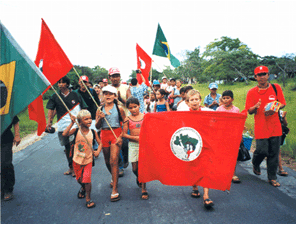|
3. The "Traps" Inherent in Land Market Policies
Maria
Luisa Mendonça and Luciano Wolff*

Photo:
Maria Luisa Mendonça
So-called
"market assisted land reform"-a phrase that has
been
strongly criticized by social movements because it doesn't
do justice to "land reform"-is based on promoting
the sale of land by large landowners to landless or near landless
families. This policy is being pushed or implemented by the
Bank in some 30 developing countries, ostensibly to "alleviate
rural poverty." Nevertheless, the findings of various
researchers and the concrete experiences of countries like
Colombia, Brazil, South Africa, Guatemala and Thailand, reveal
many problems associated with so-called "land market"
policies, including a tendency toward greater poverty.
This
Bank program runs counter the age old struggles, demands and
proposals of rural social movements for comprehensive and
broad genuine agrarian reforms. In these Bank projects, many
rural workers, hoping to realize their dream of someday owning
their on piece of land, are induced with promises of a better
life to take out large bank loans with market-rate interest
to purchase land. But instead of achieving that better life,
they soon find themselves enmeshed in a nightmare of debt
and frequently end up losing title to their new land and being
expelled all over again.
These
programs end up generating greater land concentration, and
benefit large landowners who are able to sell their worst
plots of land at heavily inflated prices, receiving full payment
up front. Furthermore, experience has shown that "market
assisted land reform" is an invitation to corruption
and clientelism, as control over the land sale and transfer
process is placed squarely in the hands of rural elites.
In
Brazil, for example, projects like the Cédula da Terra
('A ticket to land'), Land Bank, Land Credit and Combating
Poverty programs, all have the Bank seal of approval and financial
support. These projects run counter to the Brazilian legal
tenet by which expropriation of idle land (with financial
compensation) should be the principle instrument used to obtain
land. The Brazilian constitution establishes that private
farm land must fulfill a 'social function,' which means that
it should be used to produce food and other goods, and that
all relevant environmental and labor laws must be respected.
If any of these criteria are not met on a particular parcel,
then the government should "desapropriate" (confiscate
the land with financial compensation), and use it for land
reform and for settling landless families.
By
adopting the World Bank model the Brazilian State is failing
to comply with a constitutional obligation. Instead of penalizing
those who have landholdings that far exceed what they can
actually use productively, the World Bank programs reward
them, as they are now the ones who can decide to sell or not
any given plot of land. In addition, this expansion of land
markets has in many cases led landlords to jack up land prices,
thus further benefiting them.
In
dozens of countries, the Bank's structural adjustment policies
have led to the privatization of lands once held by indigenous
and minority peoples (such as the descendents of African slaves
in some parts of the Americas), and the privatization of water
and forests, leading to growing social inequality. Land market
policies are now being inserted into this context.
The
incredible similarity of the Bank policies and their impacts
being imposed across a wide range of diverse countries, is
what has generated an international movement of opposition
to "market assisted land reform." Many organizations-like
Via Campesina, FIAN, and the Land Research Action Network
(LRAN), have come together to synthesize these experiences
and disseminate information about both these World Bank policies
and about alternatives put forth by grassroots organizations.
These
organizations demand an immediate suspension of land market
programs and call for the democratization of access to land
via expropriation, with broad participation by grassroots
rural social movements in policy formulation and implementation.
Social movements want to guarantee the right to land for rural
peoples through genuine agrarian reform, accompanied by complementary
agricultural policies, which together would guarantee the
food sovereignty of their nations.
The
"Traps" Inherent in Land Market Policies, article
by Maria Luisa Mendonça and Luciano Wolff, published
in Jornal do Brasil
4.
Brazil
5.
Colombia
6.
Guatemala
7.
India
8.
Mexico
9.
South Africa
10.
Thailand
11.
Zimbabwe
12.
Positions of Via Campesina
13.
Bibliography
14.
Table of Contents
|